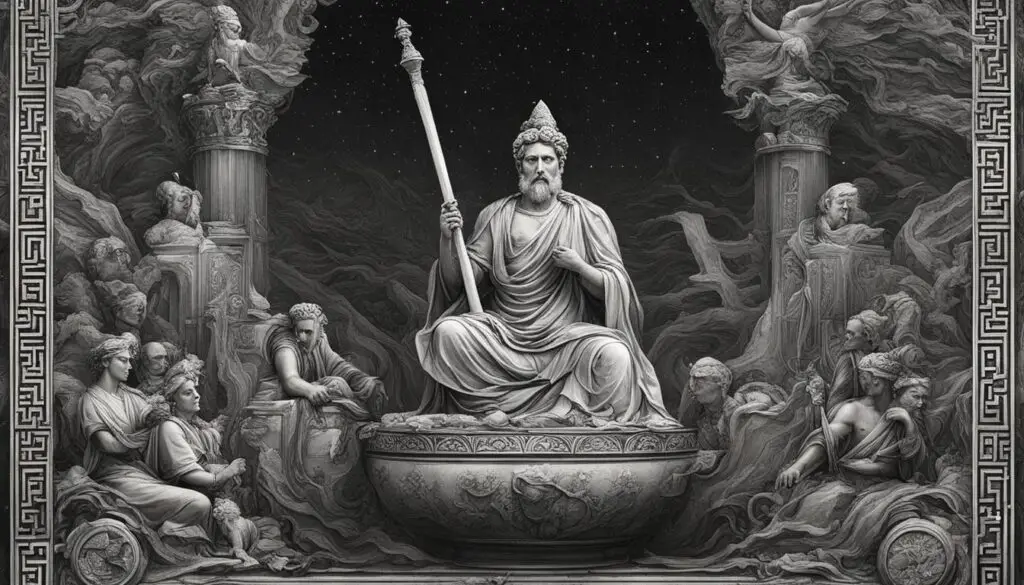In this article, we will dive into Life of the Stoics and we will explore how stoic philosophy and its principles can enrich modern life and well-being. Let's understand how the teachings of the Stoics have been applied over the years and how they may be relevant to the challenges faced today. We will explore the history of stoicism, the main philosophers and their contributions, as well as practical teachings that can be applied in our everyday lives.

Main points
- A stoic philosophy offers valuable guidance for facing the challenges of modern life.
- Stoics, such as Epictetus, Seneca, and Marcus Aurelius, influenced leaders and thinkers throughout history.
- Os stoic principles They emphasize the pursuit of virtue and self-mastery.
- O stoicism is more than a theory – it is a lifestyle which involves daily practices.
- A contemporary interpretation of stoicism highlights its relevance in the areas of work, relationships and mental health.
The Influence of the Stoics on History
The Stoics had a profound influence on history, impacting many areas of life, from politics to ethics. Stoic philosophers such as Epictetus, Seneca, and Marcus Aurelius have influenced leaders and thinkers throughout the centuries. His ideas were incorporated into political, military practices and even modern therapies. Let's explore the influence of the Stoics in different historical contexts and how his teachings remain relevant to this day.
Stoic philosophers, with their revolutionary ideas, shaped history and influenced the trajectories of many famous individuals. Epictetus was a slave who became one of the most respected philosophers of his time, writing about ethics and morality. Seneca, an advisor to the Roman emperor Nero, stood out for his works on controlling emotions and the search for serenity. Marcus Aurelius, emperor of Rome, left a legacy of thoughts on self-control and virtue.

The contribution of the Stoics transcended the limits of philosophy and was reflected in different areas of society. In politics, the ideas of the Stoics influenced rulers and leaders in making ethical and fair decisions. His notions of justice, equity and equality were fundamental to the development of more inclusive political systems. In ethics, the stoicism He defended the importance of self-control and the development of virtues, such as wisdom, courage and temperance.
But influence of the Stoics was not restricted to the past. Her teachings continue to be relevant and are applied in various areas in the contemporary world. Stoicism has gained prominence in cognitive behavioral therapies, in which Stoic principles are used to help people deal with stress, anxiety, and emotional problems. Furthermore, many leaders and businesspeople have sought inspiration from stoic teachings to make considered decisions and face the challenges of the business environment.
In short, the influence of the Stoics in history is undeniable. His concepts and ideals shaped not only philosophy, but also politics, ethics, and even psychology. Even today, his contributions continue to impact the way we live and face life's challenges.

The Fundamental Principles of Stoicism
Stoicism is based on a series of fundamental principles that provide guidance for living a good life. These principles emphasize the importance of virtue, self-mastery, and focusing on what is within our control. We will explore the basic principles of Stoicism, such as the pursuit of wisdom, the practice of virtue, and the development of emotional skills. We will see how these principles can help us deal with the challenges of modern life and cultivate greater tranquility and well-being.
In Stoicism, virtue plays a central role. The Stoics believed that virtue is the only true good and that our own happiness depends on cultivating and practicing stoic virtues. The stoic virtues include wisdom, courage, justice and temperance. Through continually seeking wisdom and improving our actions, we can become better people and increase our overall well-being.
Another fundamental principle of Stoicism is focusing on what is within our control. The Stoics taught that we should only focus on the things we have power over, namely our thoughts, emotions, and actions. By learning to accept what we cannot control and direct our attention to what is in our power, we can find greater serenity and avoid unnecessary suffering.

Additionally, Stoicism emphasizes self-control and controlling our emotions. The Stoics believed that our emotional reactions are influenced by our perception and judgment of events. By developing emotional skills, such as the ability to master fear, anger and sadness, we can prevent negative emotions from overpowering us and interfering with our well-being.
In summary, the fundamental principles of Stoicism are based on the pursuit of virtue, focusing on what is within our control, and developing emotional skills. These principles can help us deal with the challenges of modern life and cultivate greater tranquility and well-being. When practicing the stoic teachings, we can develop a resilient mindset and live a life more aligned with our values.

Stoic Lifestyle
Stoicism is not just a theoretical philosophy, but also a way of life. The Stoics practiced a series of daily routines to cultivate virtue and inner serenity. These stoic practices were fundamental to achieving a more meaningful and resilient life.
One of the most important practices in stoic lifestyle It’s daily reflection. The Stoics set aside a moment every day to reflect on their actions, thoughts, and emotions. They sought to identify which behaviors were aligned with the stoic virtues, such as courage and wisdom, and which were harmful.
Contemplation of nature was also a common practice among the Stoics. They believed that by observing the wonders of nature and understanding its universal order, they could find inspiration and emotional balance. This contemplation helped the Stoics connect with something larger than themselves and adopt a broader perspective.
Furthermore, the Stoics were constantly committed to exercising self-control. They understood that not everything is in our control, but we can control our own attitudes and reactions. Through mind training, the Stoics sought to develop the ability to face challenges calmly and serenely, accepting what they could not change and acting in accordance with their virtues.

Those stoic practices They may seem simple, but they have the power to transform our mindset and our lives. By incorporating these teachings into our routine, we can cultivate greater emotional resilience, greater mental clarity and greater peace of mind.
The Contemporary Relevance of Stoicism
Stoicism continues to be relevant in modern life, offering a contemporary interpretation of stoicism that can help us deal with the challenges and uncertainties of today's world. A stoic philosophy proposes a unique way of looking at life, providing practical guidance that can be applied in different areas, such as work, relationships, mental health and general well-being.
In modern life, it is common to feel overwhelmed by the fast pace, work pressures, social expectations and uncertainties of the future. A contemporary interpretation of stoicism invites us to reflect on what is within our control, to develop self-control, to cultivate emotional resilience and to find inner serenity even in the midst of challenges and adversity.
When it comes to work, stoicism teaches us to focus on tasks that are within our control, to accept circumstances that we cannot change, and to find satisfaction in small daily achievements. In emotional life, stoicism invites us to cultivate healthy relationships, based on virtue and mutual respect.
In the field of mental health, stoicism offers practical insight into dealing with stress, anxiety, and social pressure. By recognizing that we cannot always control external events, we can direct our attention internally, cultivating qualities such as patience, gratitude and acceptance.
Stoicism also invites us to reflect on our values and aspirations in life, questioning social conventions and aligning our actions with our deepest ideals. By focusing on living in accordance with our virtues and pursuing personal flourishing, we can find greater meaning and purpose in our lives.

The application of Stoicism today offers us a moral and emotional compass, supporting us to make more conscious decisions and face life's challenges with greater serenity. Through the contemporary interpretation of Stoicism, we can develop a more robust mentality, capable of adapting to adversity and finding balance amid the turbulence of the modern world.
Stoic Exercises for Daily Life
The Stoics developed a series of practical exercises that can be applied to our daily lives to cultivate greater emotional resilience and a more serene mindset.
One of these exercises is the practice of acceptance, which teaches us to accept things as they are, without getting attached to desires and expectations. By practicing acceptance, we are able to deal with life's challenges and setbacks in a calmer, more balanced way.
“Happiness and freedom begin with a clear understanding of one thing: some things are in our control and others are not.” – Epictetus
Another important exercise is reflecting on the worst possible scenario. By imagining the worst situation we could face, we mentally prepare ourselves to deal with adversity and reduce the fear and anxiety that normally accompanies the unknown. This exercise helps us develop emotional resilience and face challenges with courage.
Furthermore, cultivating gratitude is a stoic practice that helps us appreciate the simple, positive things in life. By focusing on recognizing and appreciating the small daily joys and gratitudes, we create a positive mindset and strengthen our emotional resilience.

Those stoic exercises They can strengthen our emotional resilience and help us face everyday challenges with more balance. By practicing these exercises, we can cultivate a stoic mindset that helps us live more peacefully and with greater well-being.
Conclusion
In this article, we explore the “Life of the Stoics” and how their philosophy can be interpreted and applied to modern life. We have seen how the teachings of the Stoics have been relevant throughout history and how they can help us deal with the challenges of today's world. We explore the fundamental principles of Stoicism, discuss your lifestyle, and present practical exercises for cultivating a Stoic mindset. We hope this information has helped you better understand Stoicism and how it can enrich our lives.

FAQ
Q: What is Stoic philosophy?
A:A stoic philosophy is an ancient school of thought that originated in ancient Greece and was developed by philosophers such as Zeno of Citium, Epictetus, Seneca and Marcus Aurelius. She teaches principles that emphasize the importance of virtue, self-mastery, and focusing on what is within our control.
Q: What are the fundamental principles of Stoicism?
A: The fundamental principles of Stoicism include the pursuit of wisdom, the practice of virtue, and the development of emotional skills. They teach us to accept what we cannot control and to focus only on our actions and thoughts.
Q: How did the Stoics influence history?
A: Stoic philosophers had a profound influence on history, impacting many areas of life, from politics to ethics. His philosophy has influenced leaders and thinkers over the centuries and his ideas have been incorporated into political, military practices and even modern therapies.
Q: How can Stoicism be useful in modern life?
A: Stoicism offers a unique perspective on how to deal with the challenges and uncertainties of today's world. It can help us live more aligned with our values and cultivate greater peace of mind. You stoic principles they can be applied to areas such as work, relationships, mental health and general well-being.
Q: What are some Stoic practices for everyday life?
A: Some stoic practices for everyday life include daily reflection, contemplation of nature, exercising self-control, practicing acceptance, reflecting on the worst-case scenario and cultivating gratitude. These practices can strengthen our emotional resilience and help us face everyday challenges with more balance.
Q: What is the contemporary relevance of Stoicism?
A: Stoicism continues to be relevant in modern life, offering a valuable perspective on how to face the challenges and uncertainties of today's world. It can help us cultivate a more resilient mindset, live in accordance with our values, and find greater tranquility and well-being.






